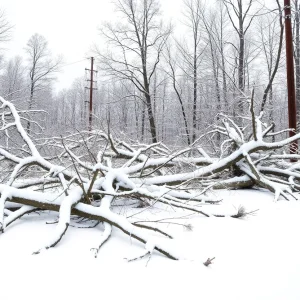Exploring the Future of Nuclear Energy in South Carolina
As the sun shines down on the bustling city of Columbia, South Carolina, residents are turning their heads to the skies, not just for the pleasant weather, with a high of 48°F and a cold low of 28°F overnight, but also for some intriguing developments in the world of energy. The atmosphere is invigorating, especially as conversations heat up around the possibility of reviving abandoned nuclear reactor projects in the region—specifically, the V.C. Summer reactors.
A Good Look at V.C. Summer
A few months ago, members of the Governor’s Nuclear Advisory Council took a trip to the V.C. Summer construction site, and they were pleasantly surprised. *“It’s in really good shape,”* one member noted, prompting discussions about the feasibility of resuming construction. This site has been stagnant for several years now, leaving many to wonder why South Carolina has not tapped into the potential of nuclear energy like some other states have.
A National Nuclear Trend
Nuclear energy is experiencing something of a revival across the United States. In neighboring Georgia, two new reactors have recently come online, and in Tennessee, the Watts Bar reactor, which had been dormant for 25 years, was completed and activated in 2016. Even in Pennsylvania, discussions are underway to restart a shuttered reactor at the infamous Three Mile Island site to power a new Microsoft data center. So, why is South Carolina lagging behind?
Stirring Up Controversy
South Carolina’s energy landscape is tricky. Dominion South Carolina and Santee Cooper, which own the unfinished reactors, seem uninterested in resuming construction. In contrast, State Senator Tom Davis is leading the charge to push for a study examining the potential for getting these reactors back on track. He argues passionately that *“the idea that we’d be looking for reasons not to do it, as opposed to energetically embracing the opportunity is unfathomable.”* This energized debate raises questions about not only the potential energy benefits but also who would foot the bill.
Energy Needs and Responsibilities
With energy demands spiking—especially from data centers—South Carolina could certainly benefit from additional nuclear power generation. Yet there is a growing concern among South Carolinians: will ratepayers end up shouldering the financial burden once again? After all, many have already paid for the reactors that never came online, and it simply wouldn’t be fair to ask them to pay for it a second time.
The *focus on sustainable energy* is another driving force behind the push for nuclear. While wind and solar technologies are advancing at an incredible rate, nuclear energy is still regarded as a reliable and efficient option for reducing carbon emissions. Of course, the question of waste management remains a significant concern; however, with the right regulations and technology, safety has vastly improved since the 1980s.
A New Opportunity?
Some experts speculate that the big tech companies might hold the key to funding the completion of the reactors. If corporations like Microsoft and Google want to secure energy for their operations, could they potentially step in to finance construction, thereby ensuring the project remains beneficial to ratepayers at large?
The Path Forward
As conversations continue, it’s clear that exploring this opportunity is essential. If South Carolina policymakers choose to pursue completing the reactors, it will be essential to establish a solid structure to prevent the mistakes of the past. In particular, the utility companies should be held accountable, ensuring there is no repeat of the previous financial mismanagement that led to the reactors’ abandonment.
In conclusion, with exciting developments around abandoned projects, *South Carolina might find itself on the brink of an energy revival*—one that addresses both the needs of tech giants and the environmental concerns of its citizens. All eyes are on Columbia now as residents wait to see how this energy debate unfolds.




























